Comic Strip Spread
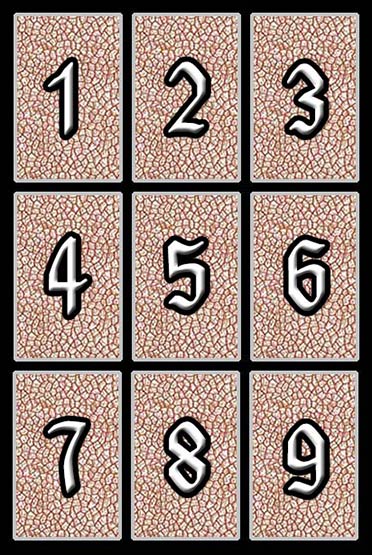
Difficulty: Easy
Note: This spread works best with decks like the Diary of a Broken Soul or Surrealist Tarot because they display scenes rather than pips and do not use reversals.
The Comic Strip Spread is a simple nine-card chronological spread that looks like a page of a comic book. This method should be used to get a glimpse of the future as it would pan out naturally. It may be insightful to use this spread in coordination with biorhythms. The spread is easy to read as a storyboard, just like a comic strip.
The main subject is apparent in the first card, while the story plays out through the following tarot cards.
It is important to pay particular attention to the cards and the relationships with their neighbours. Notice which directions the cards are facing, and how they interact.
Your Comic Strip Reading
2 of Swords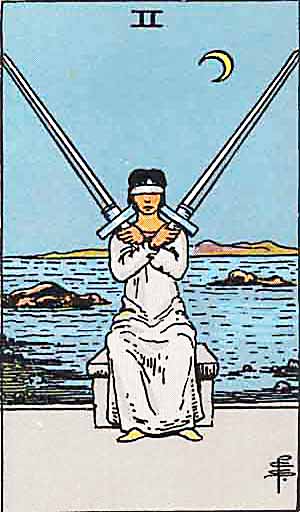 |
6 of Swords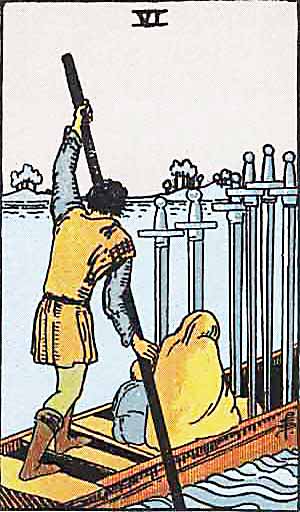 |
The Hanged Man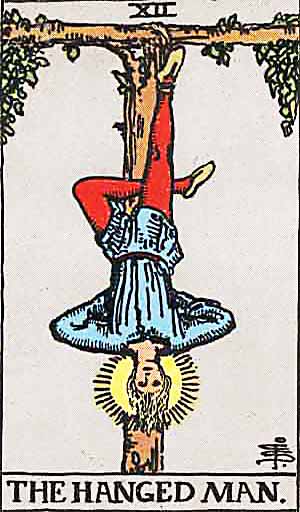 |
Knight of Pentacles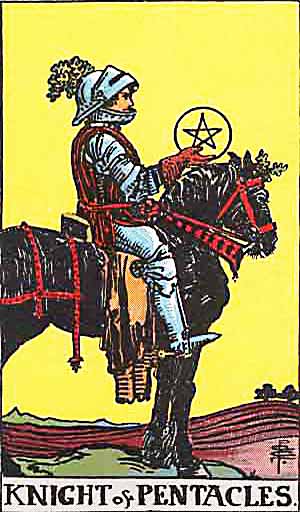 |
2 of Wands |
3 of Cups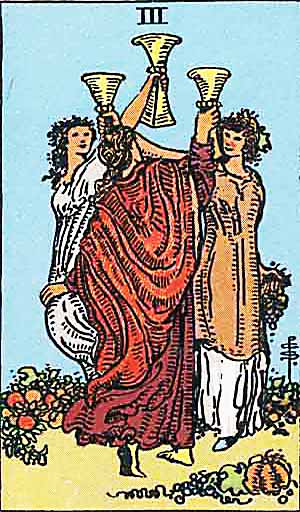 |
The Hierophant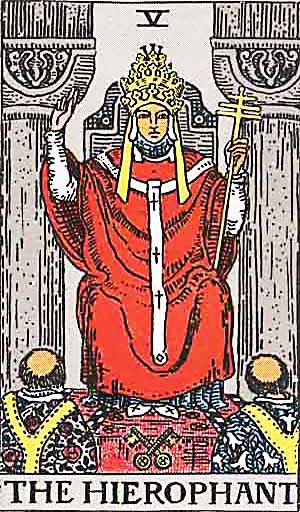 |
3 of Wands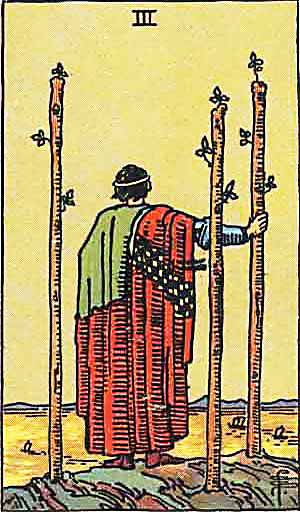 |
10 of Cups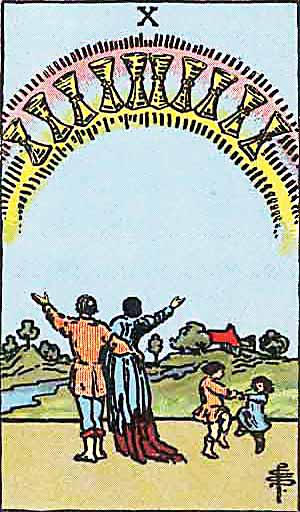 |

Card 1: 2 of Swords
A hoodwinked female figure balances two swords upon her shoulders.
Reversed Meaning:
Imposture, falsehood, duplicity, disloyalty.

Card 2: 6 of Swords
A ferryman carrying passengers in his punt to the further shore. The course is smooth, and seeing that the freight is light, it may be noted that the work is not beyond his strength.
Divinatory Meaning:
Journey by water, route, way, envoy, commissionary, expedient.

Card 3: The Hanged Man
The gallows from which he is suspended forms a Tau cross, while the figure – from the position of the legs – forms a fylfot cross. There is a nimbus about the head of the seeming martyr. It should be noted (1) that the tree of sacrifice is living wood, with leaves thereon; (2) that the face expresses deep entrancement, not suffering; (3) that the figure, as a whole, suggests life in suspension, but life and not death. It is a card of profound significance, but all the significance is veiled. One of his editors suggests that Eliphas Levi did not know the meaning, which is unquestionable nor did the editor himself. It has been called falsely a card of martyrdom, a card of prudence, a card of the Great Work, a card of duty; but we may exhaust all published interpretations and find only vanity. It expresses the relation, in one of its aspects, between the Divine and the Universe.
He who can understand that the story of his higher nature is imbedded in this symbolism will receive intimations concerning a great awakening that is possible, and will know that after the sacred Mystery of Death there is a glorious Mystery of Resurrection.
Reversed Meaning:
Selfishness, the crowd, body politic.

Card 4: Knight of Pentacles
He rides a slow, enduring, heavy horse, to which his own aspect corresponds. He exhibits his symbol, but does not look therein.
Reversed Meaning:
Inertia, idleness, repose of that kind, stagnation; also, placidity, discouragement, carelessness.

Card 5: 2 of Wands
A tall man looks from a battlemented roof over sea and shore; he holds a globe in his right hand, while a staff in his left rests on the battlement; another is fixed in a ring. The Rose and Cross and Lily should be noticed on the left side.
Reversed Meaning:
Surprise, wonder, enchantment, emotion, trouble, fear.

Card 6: 3 of Cups
Maidens in a garden-ground with cups uplifted, as if pledging one another.
Divinatory Meaning:
The conclusion of any matter in plenty, perfection and merriment; happy issue, victory, fulfilment, solace, healing.

Card 7: The Hierophant
He wears the triple crown and is seated between two pillars, but they are not those of the Temple which is guarded by the High Priestess. In his left hand he holds a sceptre terminating in the triple cross, and with his right hand he gives the well-known ecclesiastical sign which is called that of esotericism, distinguishing between the manifest and concealed part of doctrine. It is noticeable in this connexion that the High Priestess makes no sign. At his feet are the crossed keys, and two priestly ministers in albs kneel before him. He has been usually called the Pope, which is a particular application of the more general office that he symbolises. He is the ruling power of external religion, as the High Priestess is the prevailing genius of the esoteric, withdrawn power. The proper meanings of this card have suffered woeful admixture from nearly all hands. Grand Orient says truly that the Hierophant is the power of the keys, exoteric orthodox doctrine, and the outer side of the life which leads to the doctrine; but he is certainly not the prince of occult doctrine, as another commentator has suggested.
He is rather the summa totius theologiae, when it has passed into the utmost rigidity of expression; but he symbolises also all things that are righteous and sacred on the manifest side. As such, he is the channel of grace belonging to the world of institution as distinct from that of Nature, and he is the leader of salvation for the human race at large. He is the order and the head of the recognised hierarchy, which is the reflection of another and greater hierarchic order; but it may so happen that the pontiff forgets the significance of this his symbolic state and acts as if he contained within his proper measures all that his sign signifies or his symbol seeks to shew forth. He is not, as it has been thought, philosophy – except on the theological side; he is not inspiration; and he is not religion, although he is a mode of its expression.
Reversed Meaning:
Society, good understanding, concord, overkindness, weakness.

Card 8: 3 of Wands
A calm, stately personage, with his back turned, looking from a cliff's edge at ships passing over the sea. Three staves are planted in the ground, and he leans slightly on one of them.
Divinatory Meaning:
He symbolises established strength, enterprise, effort, trade, commerce, discovery; those are his ships, bearing his merchandise, which are sailing over the sea. The card also signifies able co-operation in business, as if the successful merchant prince were looking from his side towards yours with a view to help you.

Card 9: 10 of Cups
Appearance of Cups in a rainbow; it is contemplated in wonder and ecstasy by a man and woman below, evidently husband and wife. His right arm is about her; his left is raised upward; she raises her right arm. The two children dancing near them have not observed the prodigy but are happy after their own manner. There is a home-scene beyond.
Divinatory Meaning:
Contentment, repose of the entire heart; the perfection of that state; also, perfection of human love and friendship; if with several picture-cards, a person who is taking charge of the Querent's interests; also, the town, village or country inhabited by the Querent.
